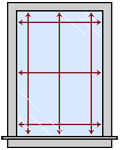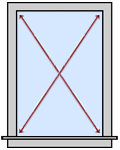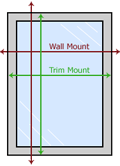Measuring your windows for blinds and shades is easy and we provide these measuring instructions to help make it even easier for you. If you have any questions regarding how to measure properly for our products then please contact us.
Important rules to follow while measuring your windows:
- Always use a steel measuring tape for accuracy.
- Write down WIDTH first then HEIGHT. Do not list them out of order.
- Measure ALL of your windows, even if they appear to be the same size.
- Never measure an existing blind/shade for your measurements.
There are two mount types to consider, Inside Mount and Outside Mount. Please note that mounting onto a door is considered an outside mount.
Inside Mount
|
|
Inside mounted blinds and shades are mounted within the window frame providing a clean, custom look. A great way to leave an attractive window trim exposed. Please note that if your mounting space is restricted in width or it is between two stationary objects then that is most likely also considered an inside mount because the inside mount deduction may be required for the product to fit.
|

To properly mount a blind inside the window's frame, your frame must be deep enough to
accommodate the mounting brackets. If the depth of your window's frame is not equal to or greater than the
minimum mounting depth, you will need to measure for an outside mount and mount your product outside the
window frame. The mounting depth must be unobstructed and flat for mounting the brackets.
The brackets for this product can be mounted to the ceiling/top and rear/wall only, they cannot be side mounted. 
Minimum Inside Mounting Depth is the minimum depth required to mount a blind inside the window
opening. This depth allows for enough flat space for the brackets to be mounted. A portion of the blind and the brackets may
protrude from the window opening.
Flush Inside Mounting Depth is the depth required to mount a blind so that it is fully recessed inside
the window casing and no portion of the blind protrudes from the window frame. Obstructions such as window cranks, handles
and other items inside the window opening must be factored into your depth measurement.
|

|
|

|
Width
Measure the exact window opening width in at least THREE (3) places: top, middle, and bottom. Take the smallest/narrowest of the 3 measurements and write it down.
If your measurement is a 1/16" or 1/32" measurement, then round it down to the nearest 1/8". This is the width you will order. Do not take any deductions from your measurement.
Example: if your smallest width measurement is 32 9/16", then round it down to 32 1/2". If your width measurement is 54 3/4", then you do not round it down. 1/8" measurements are 1/8", 1/4", 3/8", 1/2", 5/8", 3/4", 7/8", and any whole number. Height
Measure the exact height from the top inside edge down to the windowsill/window bottom in THREE (3) places: left, middle, right.
Take the largest/longest of the three measurements. If your measurement is a 1/16" or 1/32" measurement, then round it up to the nearest 1/8".
This is the height you will order.
Example: if your largest height measurement is 32 9/16", then round it up to 32 5/8". If your largest height measurement is 54 3/4", then you do not round it down. 1/8" measurements are 1/8", 1/4", 3/8", 1/2", 5/8", 3/4", 7/8", and any whole number.
Important: You must provide the smallest width measurement of the opening when ordering. If your window opening has a narrower width at any other location than where you measured, then measure that width.
Important: Do not take any deductions from your measurements. The manufacturing factory will make a 1/2" (+/- 3/16" variance)
deduction off the ordered width for the proper installation and operation of your blind. Do not increase the measured width to reduce the manufacturer deduction.
|

|
|

|
Measure the window opening on the diagonal from corner to corner. First from the top left corner to the
bottom right corner and then from the top right corner to the bottom left corner. If the two
measurements differ by more than a 1/2" then it is recommended that you switch to an outside mount.
Please note: When measuring, do not be surprised if your windows are not exactly
square, many aren't. If they are a little out of square, it will probably not be noticeable.
|
Outside Mount
|
|
Outside mounted blinds are mounted to the wall or the window trim/molding outside of the window opening and cover
an area larger than the window itself. Outside mounts provide better light control and privacy. Perfect
for windows that lack the required depth for an inside mount.
|

|
|

|
Width
Measure the width of the area you wish to cover (left to right). We recommend that your width measurement provides at least 3" of total overlap
wider than the window opening to ensure maximum light control (1 1/2" on each side). This is the width you will order.
No deductions will be made by the factory.
Height
Measure the height of the area you wish to cover, from the top of where you want to mount the blind down to the bottom where you want the blind to lower to.
Your height measurement must have the required Mininum Flat Mounting Surface (indicated in the chart below) above the window opening for proper bracket mounting, this space is part of your
overall ordered height measurement.
If you have a window sill that protrudes at the bottom of the window, stop your height measurement at the sill. If you do not have a window sill, then measure below the
window opening for coverage.
Tip:
If you have a relatively flat trim around the window opening and you want to mount to the trim, simply measure the width of the trim at the top, from the left outside
edge across to the right outside edge. This is the width you will order to allow the brackets to be mounted onto the trim.
Important: Ordered height must include at a minimum the window opening height and the required mininum flat mounting surface for mounting the
shade. Do not measure only the window opening height.
|








